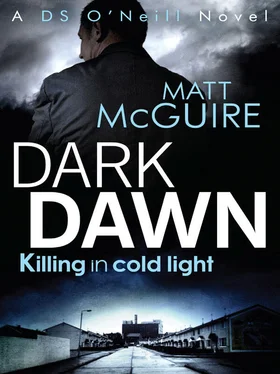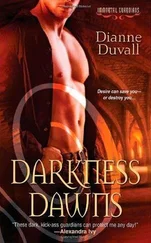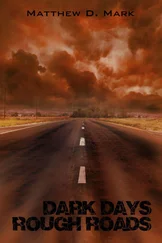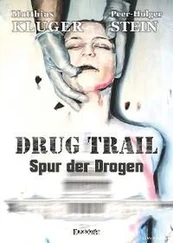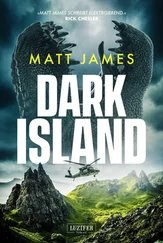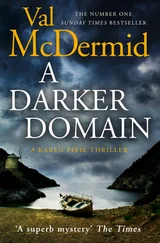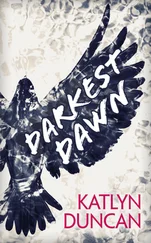Matt McGuire - Dark Dawn
Здесь есть возможность читать онлайн «Matt McGuire - Dark Dawn» весь текст электронной книги совершенно бесплатно (целиком полную версию без сокращений). В некоторых случаях можно слушать аудио, скачать через торрент в формате fb2 и присутствует краткое содержание. Год выпуска: 0101, ISBN: 0101, Издательство: Constable & Robinson, Жанр: Полицейский детектив, на английском языке. Описание произведения, (предисловие) а так же отзывы посетителей доступны на портале библиотеки ЛибКат.
- Название:Dark Dawn
- Автор:
- Издательство:Constable & Robinson
- Жанр:
- Год:0101
- ISBN:9781780332260
- Рейтинг книги:3 / 5. Голосов: 1
-
Избранное:Добавить в избранное
- Отзывы:
-
Ваша оценка:
- 60
- 1
- 2
- 3
- 4
- 5
Dark Dawn: краткое содержание, описание и аннотация
Предлагаем к чтению аннотацию, описание, краткое содержание или предисловие (зависит от того, что написал сам автор книги «Dark Dawn»). Если вы не нашли необходимую информацию о книге — напишите в комментариях, мы постараемся отыскать её.
Dark Dawn — читать онлайн бесплатно полную книгу (весь текст) целиком
Ниже представлен текст книги, разбитый по страницам. Система сохранения места последней прочитанной страницы, позволяет с удобством читать онлайн бесплатно книгу «Dark Dawn», без необходимости каждый раз заново искать на чём Вы остановились. Поставьте закладку, и сможете в любой момент перейти на страницу, на которой закончили чтение.
Интервал:
Закладка:
Matt McGuire
Dark Dawn
ONE
Belfast, 2005
It was January. It was raining. The kid was dead.
DS O’Neill pulled on his cigarette as rain drummed on the makeshift roof of Laganview Apartments. They were only a shell: steel girders, concrete foundations. The latest luxury in waterfront living. The new Northern Ireland. Least that’s what the billboard said.
Thirty yards away a couple of uniforms stood behind a band of yellow police tape. They were in a hurry. They always were. Coming off a nightshift, the last thing you wanted was to end up babysitting a stiff. It was solid peeler logic. Protect and serve, so long as you’re not freezing your balls off in the rain for six hours.
O’Neill looked at the body. The arched back, the pale face, the empty eyes that stared down the river and out to sea. He took a drag of his cigarette. Yeah. There was no rush. The kid was dead. He was dead when they arrived. He’d still be dead in ten minutes.
It was eight o’clock, Monday morning. Half an hour earlier the call had come into Musgrave Street — suspicious death. A low buzz went round the station. You couldn’t say it, but CID liked a body. Burglary, robbery, theft — sure, they had their moments. But a body? A body was the real deal. Sharpened the mind. Put an inch to your step. You spent weeks, months, wading through the same bullshit. The same bag-snatching, same robbery, same aggravated assault. A body though, a body was a headline-grabber. Even in the North. There was something about a body, something that couldn’t be denied. In a world of ‘no comment’, of ‘where’s my lawyer’, of half-truths and outright lies, a body was irrefutable. It was a fact. It couldn’t be ignored.
O’Neill looked at the wall of grey cloud that pressed down upon Belfast. It was January, almost February. Christmas was a distant memory. There was still no sign of spring. A line of police tape sealed off the entrance to the building site. CRIME SCENE DO NOT CROSS. Behind it the two uniforms swayed from foot to foot. They wore black boots, dark trousers and high-vis jackets. Fluorescent yellow was cut in two by a belt holding a pair of bracelets and the standard issue Glock 19. At the gates to Laganview two armoured Land Rovers stood guard like a couple of bouncers. They were dirty white with heavy grilles across the windscreen. One of them was scarred down the side — charred from some ‘community relations’ work in the Ardoyne the previous week.
The apartments overlooked the River Lagan as it gathered pace before spilling its guts into Belfast Lough. Across the water, the morning rush-hour crawled along Oxford Street. People huddled in their cars listening to Radio Ulster, oblivious to the contorted figure that lay on the far side of the river.
Detective Sergeant John O’Neill was anything but oblivious. He was thirty-four, but looked closer to forty. Six years of shift-work would do that to you. Beneath the suit O’Neill wore a medal, the size of a twenty-pence piece. St Michael, the patron saint of peelers. He didn’t believe in saints. Didn’t believe in God either. Catherine had given it to him when he joined up and he thought, What the hell, might as well have someone watching your back. O’Neill was six foot with black hair, going grey at the side. Catherine, his wife, used to joke about George Clooney. He told her: ‘Keep dreaming, love. It’s as close to him as you’re likely to get.’
That was a couple of years ago. When there were still jokes. Now there were lawyers — or at least, it was heading that way. Every smartarse comment might end up costing O’Neill another couple of grand. They were ‘on a break’. Catherine’s words. It had been six months and still no one in the station knew. O’Neill was in a flat on the Stranmillis Road. Catherine had stayed in the house with Sarah, their five-year-old daughter. O’Neill had asked Jack Ward, the DI, what he knew about lawyers.
Expensive.
That’s what he figured.
It might not come to that though. There was hope. There was Sarah to think about. She’d just started primary school at St Therese’s. O’Neill saw her on weekends, when his shifts allowed. Divorced at thirty-four. Christ, O’Neill thought, you fairly fucked that up in a hurry.
He looked at the body next to the river. Six years with the Police Service of Northern Ireland. It wasn’t the first time O’Neill had seen death. He’d seen it ooze out of people, a dark sickly red, as the lights slowly went out behind their eyes. He’d smelled it rotting, an old man on his sofa, six weeks before neighbours noticed the stink. He’d heard it gurgle and choke — a teenage joyrider who left a stolen car, doing seventy, via the front windscreen. At Laganview though it was the stillness. The perfect stillness. The river ran on, the rain poured down, the cars rolled by. The body, however — the body lay completely still. O’Neill kept waiting for the kid to blink, to get up and start rubbing his head. He’d look round, dazed, confused, and wonder what had happened. What was all the fuss about? O’Neill knew better though. The kid wouldn’t sit up. Wouldn’t rub his head. Wouldn’t look round him. He’d lie there. Dead still. At least until someone did something about it.
Six years. O’Neill had seen things. You couldn’t not see things, that was the job. When he signed up, he thought that’s what he wanted. To see things. To be the guy that got the call. The guy that didn’t walk away, that didn’t look away, like everyone else. He looked at the body of the twisted teenager and thought to himself: Be careful what you wish for.
O’Neill took his time, working his way down a second cigarette. You never rushed a crime scene. He knew this. Knew it deep down, like a form of muscle memory. When he’d first stepped out of the car, his stride automatically slowed and his gestures had become deliberate, more measured. His eyes changed. He stopped looking at things and started to stare. He stared at objects. He stared at sightlines. He stared at people. Bystanders, witnesses, onlookers. O’Neill knew the nightmare stories. A detective not controlling his scene. Some uniform, three weeks out of Police College, picks up a knife — ‘I’ve got something here.’ Yes, you do, mate. It’s a ‘Get Out of Jail Free Card’ for some lucky bastard. Plus a month’s paperwork and a ball-chewing for me. And Uniform wondered why CID didn’t always like them.
O’Neill remembered a conversation with the DI, Jack Ward, three weeks after he first came over to CID. The shift was asking itself the usual question: was O’Neill just another monkey out of uniform, better suited to wrestling drunks and handing out parking tickets? Ward was ex-RUC. He was in his fifties and had earned his stripes during the Troubles: 25 years, 300 dead peelers. The numbers didn’t lie.
A robbery had come in and O’Neill grabbed his coat. He needed to prove himself, show he was a worker, that he had what it took. He hadn’t popped his cherry and was still chasing his first collar. Ward stood in the doorway, smiling.
‘Detective O’Neill. A question for you. But only if you have time. .’
‘Sir?’
‘Why don’t they put blue lights on the cars in CID?’
O’Neill paused. The other DCs had been taking the piss since he arrived and it sounded like more of the same.
‘Sir?’
‘Why don’t CID have blue lights, like everyone else?’
O’Neill didn’t answer.
‘I’ll tell you,’ Ward continued. ‘Because. . by the time we get the call, the emergency’s over.’
The other DCs in the room, Kearney and Reid, laughed. The Charge of the Blue Light Brigade. That was what Ward called it.
‘Chasing guys down streets. Rugby tackles. Rolling in the dirt. Jesus. You guys watch too much TV.’ He looked round the room. ‘We’re the clean-up crew. We walk. We don’t run. By the time they send for us, the party’s always over. Our job’s to find out who made the mess.’
Читать дальшеИнтервал:
Закладка:
Похожие книги на «Dark Dawn»
Представляем Вашему вниманию похожие книги на «Dark Dawn» списком для выбора. Мы отобрали схожую по названию и смыслу литературу в надежде предоставить читателям больше вариантов отыскать новые, интересные, ещё непрочитанные произведения.
Обсуждение, отзывы о книге «Dark Dawn» и просто собственные мнения читателей. Оставьте ваши комментарии, напишите, что Вы думаете о произведении, его смысле или главных героях. Укажите что конкретно понравилось, а что нет, и почему Вы так считаете.
